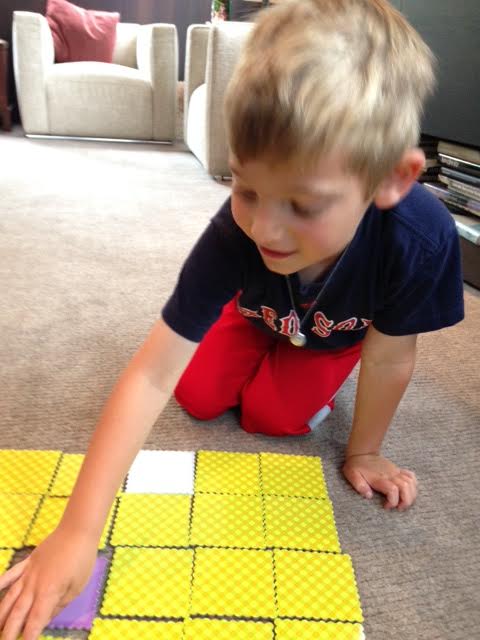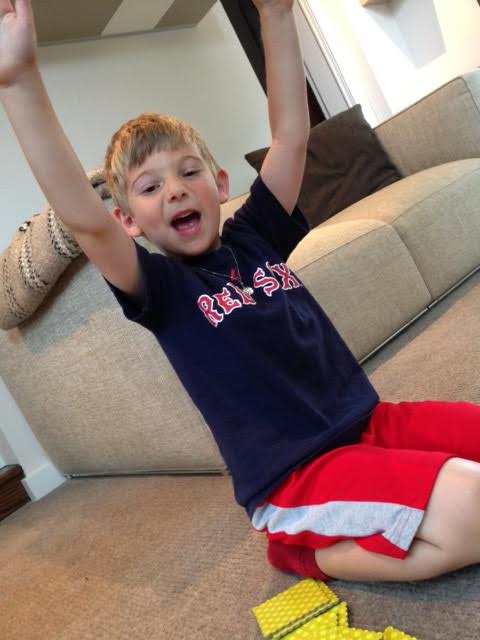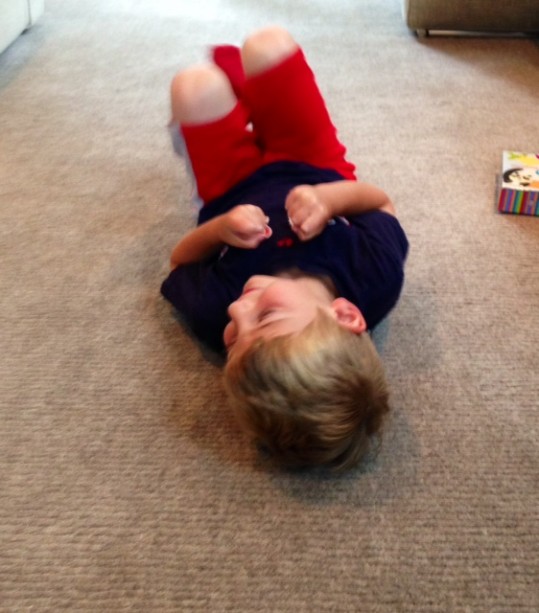 1. Grandson Eli starts the Memory game with me. (He likes to go first. And to make up the rules too.)
1. Grandson Eli starts the Memory game with me. (He likes to go first. And to make up the rules too.)
 2. Eli, legitimately, crushes me in the first game.
2. Eli, legitimately, crushes me in the first game.

3. In game two, Eli (barely) loses. Has minor ‘meltdown’ (formerly referred to as a ‘tantrum’).
(OK. The pictures aren’t as good as Ellen takes. But you get the point.)
My question is about winning and losing.
I know I’ve written about this elsewhere on MillersTime, and some of you were so kind as to offer your excellent advice. That was in the post A Question from a 4 1/2 Year Old.
But now my question is a bit different.
In playing with one’s grandkid (or your own kid, for that matter), what is the proper way the elder should approach the competition?
1. Let the little tyke win?
2. Crush the kid?
3. (You supply the answer)
As you consider your answer, think about all kinds of competition, sports, board games, word games, coming in first at anything, etc. Eli seems able to turn everything we do into a contest. Should the elder’s approach differ depending upon the ‘game’?
Please advise.
Thanx.
Richard
PS:
My own parenting was with two daughters, and they were much less competitive than my grandson seems to be. So I have not had to face this momentous question quite as directly as I do now.
Actually, lest you think this may be a sexist issue, it appears that granddaughter Abby is as competitive as her brother.
And then there’s one-year old Ryan, who is soon likely to crush all of us in whatever game we indulge.
PPS:
As a child, and until recently, I was more than extremely competitive.
I loved any kind of competition.
And I hated losing.
To anyone.
PPPS:
My father once beat me in chess, playing blindfolded, when I was about seven.
I didn’t play chess again for years.


Jackie Reed said:
If he never has to lose, he will never know he has the strength to deal with loss/disappointment, etc.
If adults fake always being the one who loses, kids learn we’re fakes.
Guarantee the kid wins sometimes and let the chips fall where they may the rest of the time.
Can ya tell I’m from the Ozarks yet?
Jackie
Joe Chamberlin said:
My grandson, now 9 typically beats me at oui tennis but I do beat him, fairly, once in awhile…in other oui games he prevails. He has grown to the point where tantrums have become, “Let’s play again.”
Chess still causes breakdowns.
Our backyard soccer games are pretty even. He started playing tennis but will be getting lessons so the volleying will soon take on a new form.
As for letting him win, if he can play, let’s play. There was a recent commencement address wherein the speaker took on the notion of everybody gets a trophy…
When my younger son graduated high school I gave his middle school soccer coach a card thanking him for teaching my son John, how to lose.
Lydia said:
I can’t agree enough with the above comments. Eli needs to learn how to lose. And the only way he’ll do that is through losing. And the best part about losing to his Grandpapa instead of, say, the school bully, is that it’s followed by hugs and kisses instead of gloating.
I’m fairly sure I included this link in my comments to your last post on this issue, but it’s still an article that I refer to frequently in both my own life and when friends are musing on this same issue with themselves or their own children. A friend of mine gave it to me after her therapist gave it to her because she had been “helicoptered” as a child. She’s had to learn, as an adult with a baby of her own, how to lose, and she’s alternatively furious and straight-up bemused at her own parents. It’s a gem.
http://www.theatlantic.com/magazine/archive/2011/07/how-to-land-your-kid-in-therapy/308555/
And, I don’t know if Eli likes Pixar, but The Incredibles addresses this head-on, in only the way that Pixar can.
EllnMllr said:
Never a problem for me. He beats me at the memory game fair and square. And at tick tac toe. And at ‘go fish.’ Every single time. More worried about my self esteem than his!
BT said:
Beat him. And call him out for cheating. When he is playing with his friends, he will have a much ruder awakening than if he learns the right way to play with you (or his parents).
Learning to deal with disappointment is a critical life skill.
lizFrost said:
It is important to have the same rules for the same games. Discuss the fact games have first, second, third place winners with runner-ups. Use your baseball team as an example. The lesson is easier to learn as a 4 1/2 year old.
Good Luck, liz
Anonymous said:
“It doesn’t matter whether you win or lose, it’s how you play the game.”
I keep forgetting where this comes from, but it’s what my sports-loving, son-free father and grandfathers taught me. And it wasn’t because I am female; it was because I was the one they were taking to the Giants, Yankees, Giants, Rangers, Knicks, Senators games. I became the fan they wanted to be with.
This filtered into my teaching career. As Pirsig once wrote, “The real motorcycle you’re competing with is yourself.” Students can be guided toward self-improvement by training them that their only competitor is themselves. Now this is hard in today’s sports-videogame-celebrity world. Some of my students at Cesar Chavez who were in Saturday classes because they’d flunked a marking period of English preferred to compete with me (and the lessons I brought) trying to improve their skills or learning how to read. And that is why so many kids have trouble. Gaming, winning, succeeding, being better than others, being unique are now prized more in our culture than learning, growing, failing and then struggling to succeed, helping, listening, reading.
I just finished yesterday’s NYTimes piece on the Common Core standards which will be shot down by conservatives shortly. The standards value individual critical thinking and avoid “everyone gets a prize.” Whenever I teach drama classes to those younger than adolescent and some of the kids @ Frost too, I adopt the chess phrase “thank you for playing.” And did you know that in every professional ballet class on the planet, when a teacher “gives a correction,” the student says “thank you”? Every ballet class ends with what is called a “reverence,” the students bow to the teacher. Life post-I’m OK/You’re OK could use a dose of learning how to handle loss and on how being a mensch matters more than being a millionaire.
When I rehearsed plays with high school kids, and they made the same mistake for 9,643rd time, before and after clarifying whether they knew how it was supposed to be, all I’d ever say was “it has to be wrong before it can be right.” (The French word for a director in theatre is repetiteur. And it’s what baseball managers and effective coaches in all sports must master–the art of leading someone through enough repetitions to master something.) Rehearsals (and batting practice) are the places where you can make all the mistakes you have to before you excel. (and classes, and while you’re a child)
So there’s some advice in there somewhere for grandad and Eli.
James Cooke said:
My advice is to focus on the joyful participation in the sport, win lose or draw. The fundamental rule is mutual respect in the engagement. It begins with an understanding of the relationship. Start with the paradox of union in opposition, of growth in conflict. And in that paradox is found most of life’s lessons. All the other stuff – wining and losing – is for the record books.
I’m amused by U.S. National Women’s Soccer star Mia Hamm who said, “Whoever said winning isn’t everything never won anything.” It has a ring of truth to it, but it’s nothing more than a sweeping generalization. Is it the essence of sports? I leave that for the sporting philosophers of the world to engage in hearty debate.
Land Wayland said:
My grandmother loved to play both checkers and monopoly against me when I was 10-13 and she always did her best to win and insisted that I do the same. She said (1) you have to learn what is a game and what isn’t and if you lose to remember that it was only a game and another one can be played (2) you have to learn to lose without letting it destroy you. Hurt you, yes but destroy you no, (3) learn from losing and learn when it was skill that beat and when it was luck (4) when you wing just say “thank you” for the game and never, never, gloat or rub it in or there won’t be another game until she felt like it. That all helped a little when I lost and I learned to (A) ask for a rematch and (B) to better next time.
And I still turned out the way I did.
Carrien said:
Rick!!! He sounds like you!!!
We all need to learn to win or lose with grace
Nancy Cedar Wilson said:
Very wise friends you have! I agree with many of their comments–but what I loved the most about this post, was your confession regarding your own competitiveness, and how you didn’t play chess for years after you lost to your blind-folded father! LOVE IT!! (& understand it! I’m with you!)
samuel clover jr said:
good morning rick @ d ocean va beach…ok what would sam say…here goes…playing the game with your grandson is the winner,key words social skills development,human interaction,all that good stuff,instead of tv,ipods etc,enough said lol…..mr. sam
Hilary Levey Friedman said:
Well you must, of course, read my book to find out the answer… It’s even about chess. :) http://www.amazon.com/gp/product/0520276760/ref=as_li_tl?ie=UTF8&camp=1789&creative=390957&creativeASIN=0520276760&linkCode=as2&tag=platowin-20&linkId=O5JF7JTA5KOEYVDI